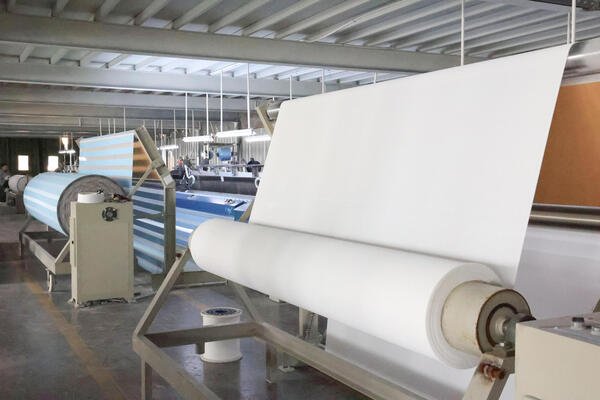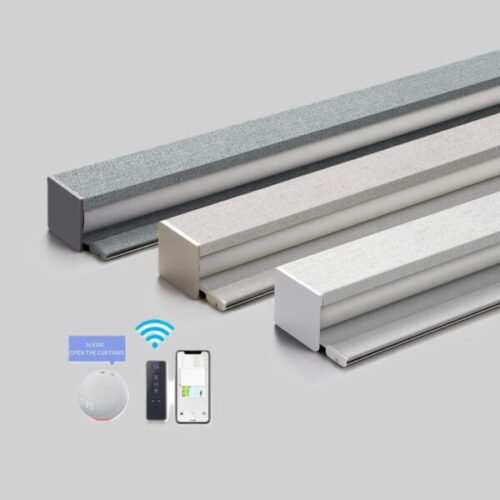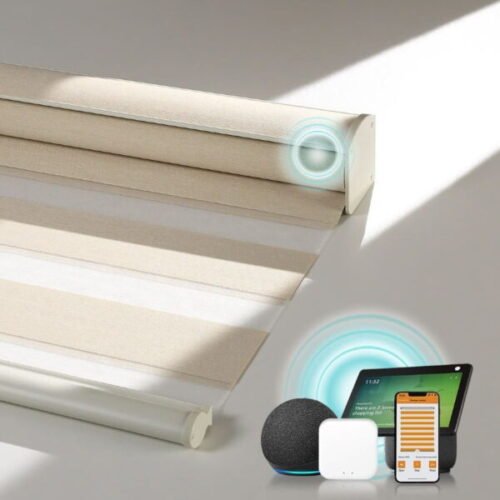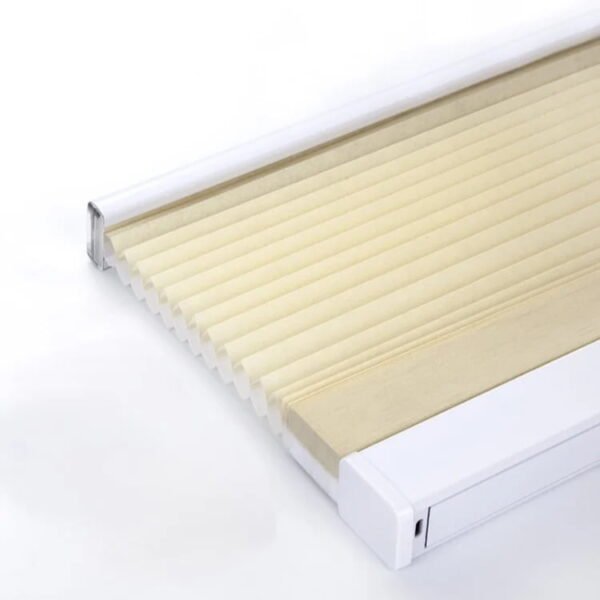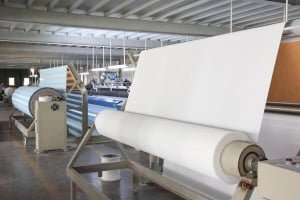Understanding the cost of motorized shades in 2025 is more than just looking at the price tag. Many things change the final cost, from the motor itself to the fabric and how it is installed.
The cost of motorized shades in 2025 depends on motor type, control options, fabric choice, and installation complexity. While the upfront investment may be higher, they offer a good return through energy savings, increased property value, and user convenience.
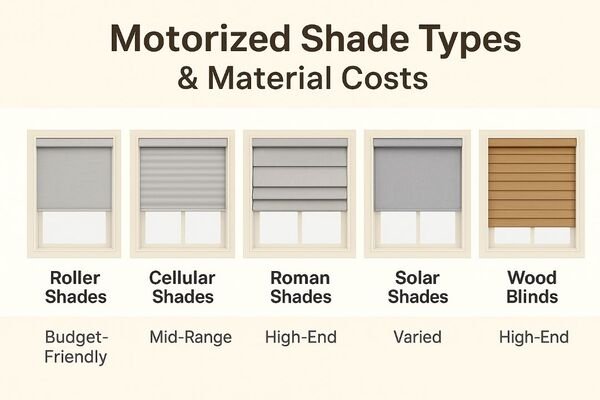
I know that managing project budgets is critical. When my clients ask about motorized shades, I need to give them a clear picture of the costs. This involves looking at all the pieces that make up the final price. Let us break down what really drives the cost of motorized window shades.
What Factors Influence the Cost of Motorized Shades?
Are you wondering why prices for motorized shades can vary so much? Many things play a part, not just the motor.
The cost of motorized shades is influenced by the motor type (wired or battery), control system (remote, wall switch, smart home integration), fabric choice, shade size, brand, and installation complexity. Each adds to the total investment.
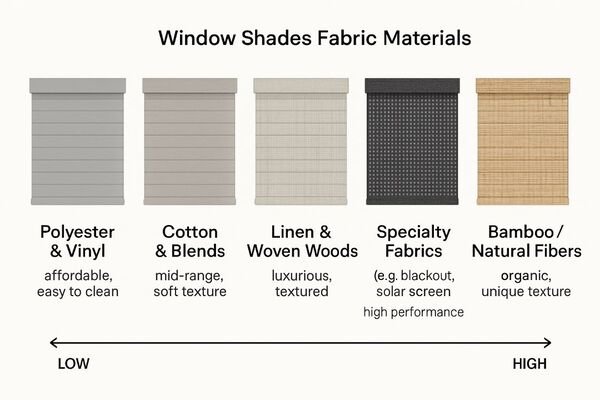
I have learned that the cost of motorized shades is not a single number. Many pieces contribute to the final price. First, the type of motor is very important. Battery-powered motors are usually easier to install and often cost less upfront, but they need battery changes. Wired motors, either low voltage or high voltage, are more powerful and reliable for large or very frequent use, but they require electrical wiring, which adds to installation costs. Second, the control options greatly affect the price. A basic remote control is standard. Adding wall switches, timers, or integrating with smart home systems like Google Home or Amazon Alexa will increase the cost. Shadesmart specializes in seamless smart home integration, which is often a key request from my clients. Third, the fabric choice plays a huge role. Different materials—from basic light-filtering polyesters to premium blackout fabrics, sustainable options, or specialized solar screens—come at various price points. The fabric affects light control, energy efficiency, and overall aesthetics. Fourth, the size of the shade matters. Larger windows require more material and more powerful motors, leading to higher costs. Finally, the brand name and complexity of installation also contribute. Premium brands often have higher costs but can offer better warranties and features. Complex installations, such as those requiring custom mounts or electrical work, will drive labor costs up.
| Factor | Description | Cost Impact (General) |
|---|---|---|
| Motor Type | Battery (easier install, battery changes), Wired (low/high voltage, reliable, needs wiring). | Battery often lower upfront; Wired higher for install, but long-term reliability. |
| Control System | Basic remote, wall switch, timer, smart home integration (Alexa, Google Home). | Increases with sophistication and integration features. |
| Fabric Selection | Basic polyester, premium materials, blackout, sustainable, solar screen. | Varies widely based on material, properties, and brand. |
| Shade Size | Larger windows require more material and stronger motors. | Directly proportional to surface area and motor power. |
| Brand & Features | Premium brands, advanced features, specific aesthetics. | Higher cost for enhanced quality, features, and design. |
| Installation Complexity | Basic vs. custom mounts, electrical work, multi-shade integration. | Drives labor costs up for more challenging installs. |
How do Different Motorization Technologies Impact Pricing?
Are you confused by all the motor types and how they change the price? Understanding the motor is key to understanding the total cost.
Different motorization technologies impact pricing based on power source (battery vs. wired), voltage (low vs. high), and advanced features (two-way communication, quiet operation). Battery motors typically have lower installation costs, while wired offers greater power and reliability for larger systems.
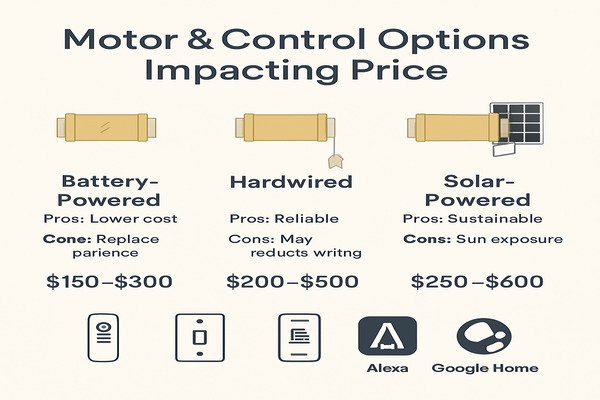
From my experience, the motor itself is a primary cost driver for motorized shades. I have learned to distinguish between the main technologies. First, battery-powered motors are often the most affordable entry point. They are easier and cheaper to install since they do not require electrical wiring. However, they need periodic battery replacement or recharging, which is an ongoing maintenance consideration. Second, low-voltage wired motors (usually 12V or 24V) provide more consistent power than battery options and are relatively safe to install. They do require a power supply unit and wiring, which adds to the installation cost, but they offer greater reliability. These are often used for medium-sized shades or where multiple shades are grouped. Third, high-voltage wired motors (110V/220V) are the most powerful and reliable option. They are essential for very large, heavy shades or for integrating with a building's main electrical system. However, they require a licensed electrician for installation, which significantly increases labor costs. Finally, advanced features within motors, like ultra-quiet operation, positional feedback (two-way communication), or built-in smart functionality, also drive up the price. Shadesmart offers a range of motors, including those with advanced features and quiet operation. Choosing the right motor depends on the shade size, frequency of use, and budget.
| Motorization Technology | Description | Price Impact |
|---|---|---|
| Battery-Powered | Runs on disposable or rechargeable batteries, no wiring needed. | Lowest initial installation cost; ongoing battery expense. |
| Low-Voltage Wired | Requires a power supply unit and wiring (12V/24V). | Moderate installation cost; reliable, consistent power. |
| High-Voltage Wired | Plugs directly into mains electricity (110V/220V), requires electrician. | Highest installation cost; most powerful and reliable for large shades. |
| Advanced Features | Ultra-quiet operation, two-way communication, integrated smart controls. | Increases motor unit cost significantly. |
| Brand/Quality | Tier 1 brands (e.g., Shadesmart) offer superior reliability and warranty. | Higher upfront cost, but reduced long-term maintenance/replacement. |
What is the ROI for Investing in Motorized Window Shades?
Are you wondering if the extra cost for motorized shades is really worth it? It is not just about convenience; there are real financial benefits.
Investing in motorized window shades offers a strong ROI through enhanced energy efficiency leading to lower utility bills, increased property value, improved security, and significant day-to-day convenience that elevates user experience.
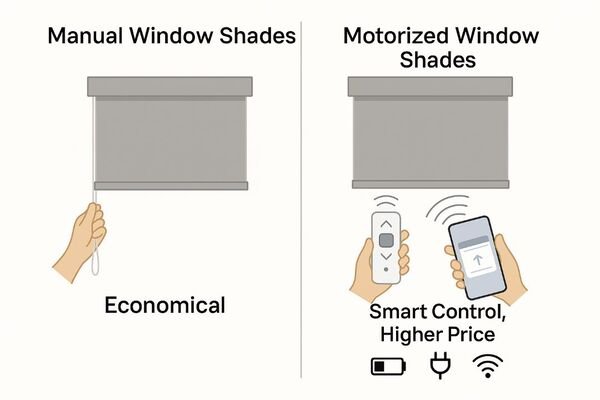
I often get asked about the return on investment (ROI) for motorized shades by my clients. While the initial outlay can be higher, the long-term benefits are substantial. First and foremost, energy efficiency is a huge ROI driver. Motorized shades can be programmed to open and close automatically, optimizing natural light and insulation. For instance, they can close on hot afternoons to block sun and save on AC, or open on cold mornings to let in passive solar heat. This significantly reduces heating and cooling costs over time. Second, motorized shades undeniably increase property value. They are seen as a modern luxury amenity, appealing to potential buyers or renters. This is especially true for smart-integrated systems. Third, enhanced security is another benefit. Programmed shades can create the illusion of occupancy when a building is empty, acting as a deterrent to potential intruders. Fourth, convenience and aesthetics improve tenant satisfaction. The ease of adjusting shades with a button, app, or voice command, especially for high or hard-to-reach windows, is invaluable. This improved living or working environment can justify higher rents or command higher prices. Finally, reduced wear and tear on the shades themselves, compared to manual operation, extends their lifespan, saving on replacement costs. Shadesmart's durable products amplify this long-term value.
| ROI Benefit | Description | Financial/Project Impact |
|---|---|---|
| Energy Efficiency | Automated opening/closing to optimize insulation and heat gain/loss. | Significant reduction in utility bills (heating/cooling). |
| Increased Property Value | Modern luxury amenity, enhances appeal for buyers/renters. | Higher resale value or rental income potential. |
| Enhanced Security | Programmed movement simulates occupancy, deters intruders. | Added peace of mind and protection for property. |
| Convenience & Aesthetics | Easy control (remote/app/voice), clean lines, effortless operation. | Improved user experience, higher tenant/occupant satisfaction. |
| Reduced Wear & Tear | Smooth motor operation minimizes stress on fabrics and mechanisms. | Extended product lifespan, reduced maintenance and replacement costs. |
How Can B2B Buyers Get Accurate Cost Estimates for Projects?
Are you always guessing about how much motorized shades will truly cost your project? Getting a clear estimate upfront is crucial.
B2B buyers can get accurate cost estimates by providing detailed project specifications, requesting multi-tiered quotes from reputable suppliers, inquiring about volume discounts and package deals, and accounting for all installation and smart integration costs upfront.
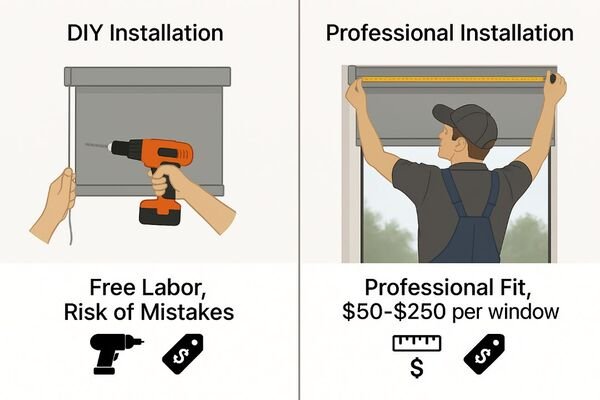
Getting accurate cost estimates is essential for my projects. I do not like surprises! I have a few strategies I always use. First, I provide incredibly detailed project specifications. This means giving the supplier exact window dimensions, desired fabric types (including specific light control needs), preferred motor technologies (battery, low-voltage, high-voltage), and specific control preferences (remote, wall switch, smart home integration requirements). The more information I give, the more accurate the quote will be. Second, I request multi-tiered quotes from reputable suppliers like Shadesmart. This means asking for pricing options at different quality levels or with varying features. Sometimes a slight upgrade in motor or fabric can provide much more value. Third, I always inquire about volume discounts and package deals. For large commercial projects, bulk orders should come with better pricing. A good supplier will offer incentives for an entire building or multiple units. Fourth, I factor in all associated costs. This includes shipping, installation labor (especially for wired systems requiring electricians), smart home programming, and any necessary accessories or custom hardware. I ensure these are detailed in the quote. Finally, I ask for a clear breakdown of pricing, unit by unit, as well as any service agreements or warranties. This transparency helps me compare offers and present a solid budget to my clients.
| Strategy | Description | Benefit for Cost Estimation |
|---|---|---|
| Detailed Project Specs | Provide exact dimensions, fabric type, motor tech, control preferences. | Ensures highly accurate and tailored quotes, prevents assumptions. |
| Multi-Tiered Quotes | Request pricing options for different quality levels or feature sets. | Allows for budget flexibility and value-based decision-making. |
| Volume Discounts/Packages | Inquire about special pricing for large orders or bundled solutions. | Significantly reduces overall project costs for bulk purchases. |
| All-Inclusive Costing | Account for shipping, installation labor, programming, and accessories. | Avoids hidden costs, provides a complete and realistic budget. |
| Transparent Breakdown | Request a clear itemized list of all costs and service terms. | Facilitates comparison between suppliers and builds trust. |
Conclusion
The 2025 guide to motorized shade costs shows that many factors influence the final price, from motor type to fabric. The upfront investment yields a strong ROI through energy savings, increased property value, and user convenience. Accurate estimates come from detailed specs and transparent supplier communication.
